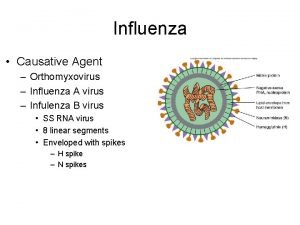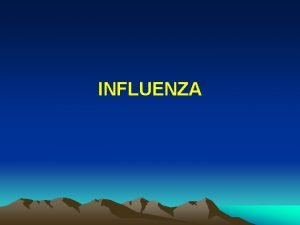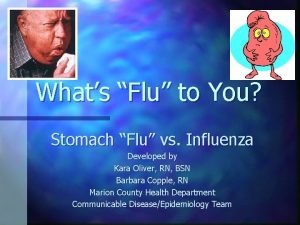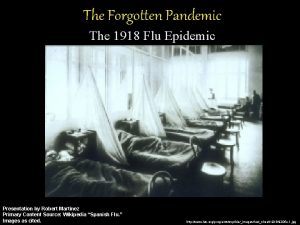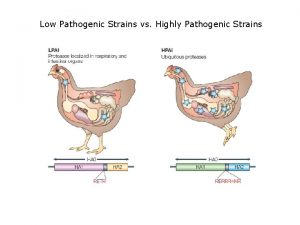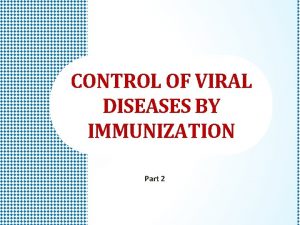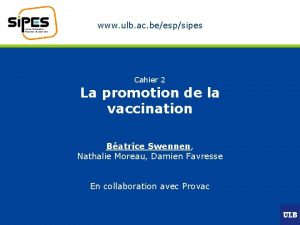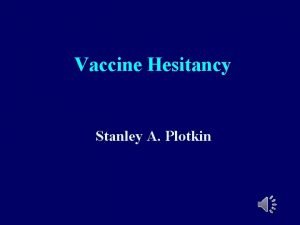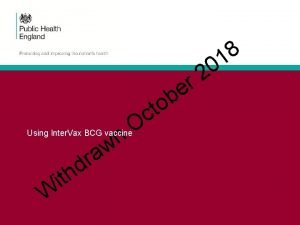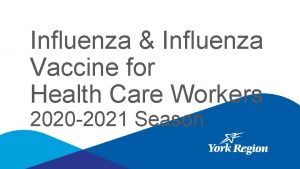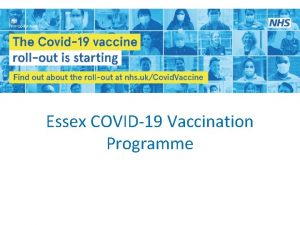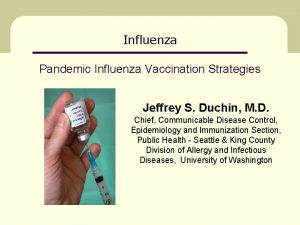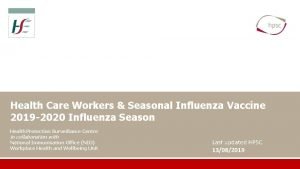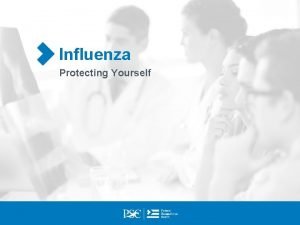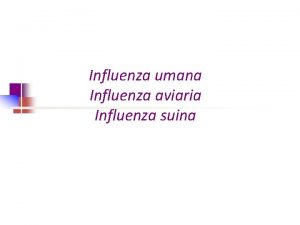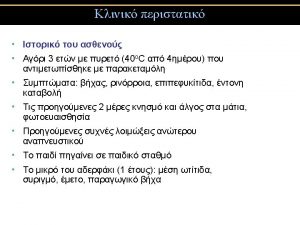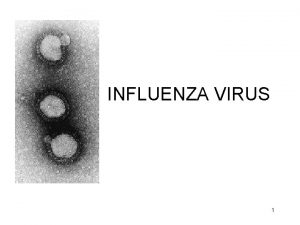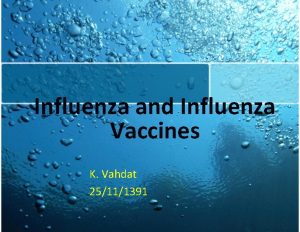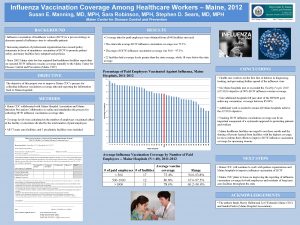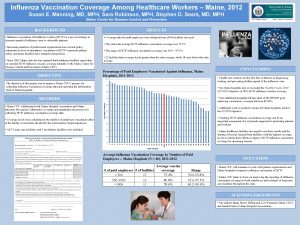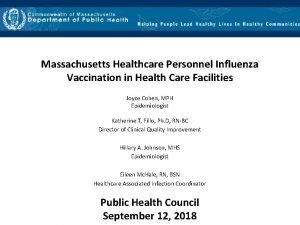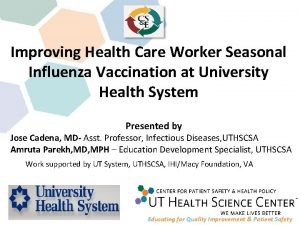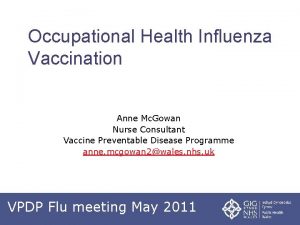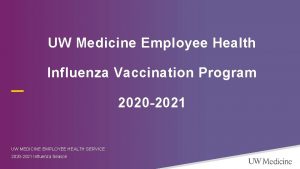2019 Influenza vaccination for Health Care Workers Information



















- Slides: 19

2019 Influenza vaccination for Health Care Workers Information and general advice session Ananda Aged Care - April 2019 *No individual advice can be given at this session: For individual advice and/or to provide a medical certificate to opt out of free Workplace vaccination speak to your G. P. or health professional

What is influenza (‘the flu”) A contagious illness of the respiratory tract, caused by infection with influenza viruses Spread by aerosol (sneezing, coughing, talking) or touching infected surfaces Virus can survive in the air for 1 -2 hours, and on hard surfaces for 8 -24 hours Usually more severe, and lasts longer than other viral respiratory illnesses


Common symptoms of the flu Symptom Influenza Cold Fever Headache Extreme fatigue Aches and pains/muscle pain Tiredness and weakness Cough/chest discomfort Runny or stuffy nose Sneezing Sore throat

People with influenza can be infectious to others for days before symptoms start & about a week after Children may shed for longer than 7 days and effectively spread the virus (“super spreaders”) Vaccination helps protect individuals from Spreading the flu and reduces transmission to vulnerable people such as infants, older adults, and immunocompromised individuals


The flu in ‘normal’ years causes… 2, 500 – 3, 500 DEATHS 18, 000 hospitalisations 350, 000 GP visits Most not confirmed as not tested People at increased risk of complications are more likely to be hospitalised or die from influenza

Influenza vaccination is strongly recommended, provided under the Australian National Immunisation Program (NIP) and should be actively promoted for • Older adults aged 65 years and above • Pregnant women Ø Helps protect the woman, her unborn child, and the infant from 0 -6 months of age • People 6 months of age with medical conditions placing them at risk of serious complications of influenza

Our role in preventing ‘flu outbreaks HCWs can transmit the influenza virus to patients in their care, many of whom are at risk of developing influenza complications Even with mild or atypical influenza symptoms, HCWs can shed the virus and infect others HCWs may also continue to work when feeling ill X Annual immunisation of healthcare workers helps prevent influenza infection & and minimises exposure of vulnerable residents

Resident focused care = above all do no harm

Influenza vaccination is strongly recommended for anyone ≥ 6 months of age who wants to reduce the risk of contracting or transmitting influenza. (W. H. O. & ATAGI)

Flu is here all the time, but…. In temperate areas flu has a different peak but in SA it is usually Agust/September & April/May the best time to vaccinate In 2017 rates were highest since 2009 – a pandemic year Most deaths are in people aged >75

What people with flu may look like…

Types of flu There are three types of influenza viruses; A, B and C ØInfluenza A and B cause most disease in humans Iinfluenza viruses are divided into sub-types, based on two proteins found on the virus surface ØHaemagglutinin & Neuraminidase Influenza B viruses are divided into two lineages Victoria & Yamagata Quadrivalent influenza vaccines (QIVs) contain both subtypes of influenza A virus and both lineages of influenza B virus

It is difficult to predict which types of influenza virus will be most prevalent each season In Australia, the proportion of disease due to: Influenza A versus influenza B viruses and BYamagata versus B-Victoria lineages varies from year to year

Types of flu vaccine Quadrivalent influenza vaccines (QIVs) contain two influenza A virus sub-types + two (both) influenza B virus lineages – for under 65 s Trivalent influenza vaccines (TIVs) contain two influenza A virus sub-types + one of the two influenza B virus lineages – fo over 65 s

Who should NOT have the flu vaccine? Postpone with acute severe febrile illness Use caution in people with coagulation disorders, as bleeding can occur People with a history of Guillain-Barré Syndrome (GBS) If a documented previous anaphylactic reaction (difficulty breathing, hospitalisation etc) to the flu vaccine, or any of its ingredients If no previous severe reaction but concerned (eg ? an egg allergy)– go to GP and have it there or get a medical certificate/note stating not advisable to have it

Common reactions to the ‘flu vaccine Adults Children 3 -17 yrs Fatigue Muscle pain (myalgia) Injection site pain Injection site redness Injection site swelling Irritability

Take home messages Influenza is a highly contagious disease which can cause hospitalization and even death – especially in vulnerable groups like children and aged people This may be a very bad flu year The flu vaccine is the best protection you can have – so have it! It is generally safe and there are few and minor side effects Those who should not have the vaccine are rare – they should get a certificate from their GP and not have the vaccine Those with concerns about the vaccine should speak to their GP and have the vaccine at their GP surgery if needed
 Influenza vaccine dosage chart 2019-2020
Influenza vaccine dosage chart 2019-2020 Primary secondary tertiary health care
Primary secondary tertiary health care Raggio di influenza materozza
Raggio di influenza materozza Flu causative agent
Flu causative agent The great influenza rhetorical analysis
The great influenza rhetorical analysis Albert osterhaus
Albert osterhaus Influenza
Influenza Stomach flu vs influenza
Stomach flu vs influenza Is influenza a airborne disease
Is influenza a airborne disease Fibertel
Fibertel Influenza ww1
Influenza ww1 Influenza virus replication
Influenza virus replication Low pathogenic avian influenza
Low pathogenic avian influenza Poultry vaccination schedule
Poultry vaccination schedule Vaccination schedule in palestine
Vaccination schedule in palestine Dog vaccination perry county
Dog vaccination perry county Defaulter vaccination schedule
Defaulter vaccination schedule Vaccination bruxelles
Vaccination bruxelles Mandatory vaccination
Mandatory vaccination Intervax vaccine
Intervax vaccine



